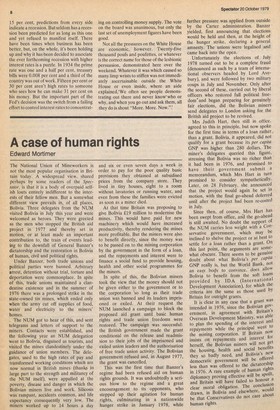A case of human rights
Edward Mortimer
The National Union of Mineworkers is not the most popular organisation in Bri tain today. A widespread view, shared perhaps by some readers of the Spec, tator, is that it is a body of overpaid selfish louts entirely indifferent to the inter ests of their fellow men. But a somewhat different view prevails in, of all places, Bolivia. Three delegates from the NUM visited Bolivia in July this year and were welcomed as heroes. They were greeted as the men who stopped the British aid project in 1977 and thereby set in motion, or at least made an important contribution to, the train of events leading to the downfall of General Banzer's dictatorship and the restoration in Bolivia of human, civil and political rights.
Under Banzer, both trade unions and political parties were banned. Arbitrary arrest, detention without trial, torture and deportation were commonplace. In spite of this, trade unions maintained a clandestine existence and in the summer of 1976 there was a prolonged strike in the state-owned tin mines, which ended only when the army cut off supplies of food, water and electricity to the miners' homes.
The NUM got to hear of this, and sent telegrams and letters of support to the miners. Contacts were established, and the following year an NUM delegation went to Bolivia, disguised as tourists, and visited the mines clandestinely under the , guidance of union members. The delegates, used to the high rates of pay and transformed working conditions which are now normal in British mines (thanks in large part to the strength and militancy of the NUM itself), were appalled at the poverty, disease and danger in which the Bolivian miners live and work. Silicosis was rampant, accidents common, and life expectancy consequently very low. The miners worked up to 14 hours a day and six or even seven days a week in order to pay for the poor quality basic provisions they obtained at subsidised prices from the company store. They lived in tiny houses, eight to a room without lavatories or running water, and even from these the families were evicted as soon as a miner died.
At that time Britain was proposing to give Bolivia £19 million to modernise the mines. This would have paid for new machinery which would have increased productivity, thereby rendering the mines more profitable, But the miners were also to benefit directly, since the money was to be passed on to the mining corporation by the government in the form of a loan, and the repayments and interest were to finance a social fund to provide housing, health and . other social programmes for the miners.
In spite of this, the Bolivian miners took the view that the money should not be given either to the government or to the corporation so long as their trade union was banned and its leaders imprisoned or exiled. At their request the NUM launched a campaign to block the proposed aid grant until basic human rights and trade union freedoms were restored. The campaign was successful: the British government made the grant conditional on the release and readmission to their jobs of the imprisoned and exiled union leaders and the authorisation of free trade union activity. The Bolivian government refused and, in August 1977, the grant was cancelled.
This was the first time that Banzer's regime had been refused aid on human rights grounds. It was undoubtedly a serious blow to the regime and a great encouragement to its opponents, who stepped up their agitation for human rights, culminating in a nationwide hunger strike in January 1978, while






































 Previous page
Previous page